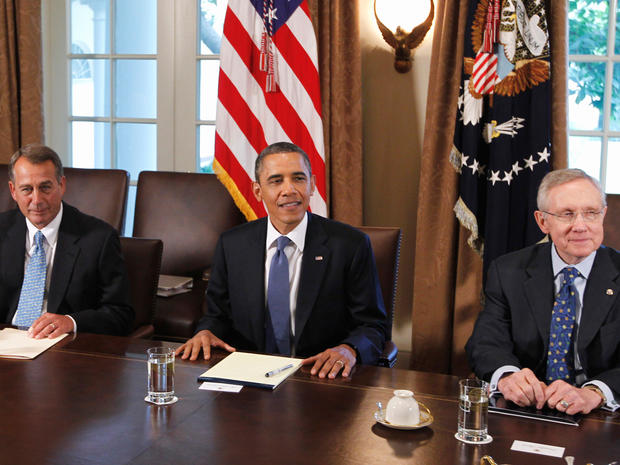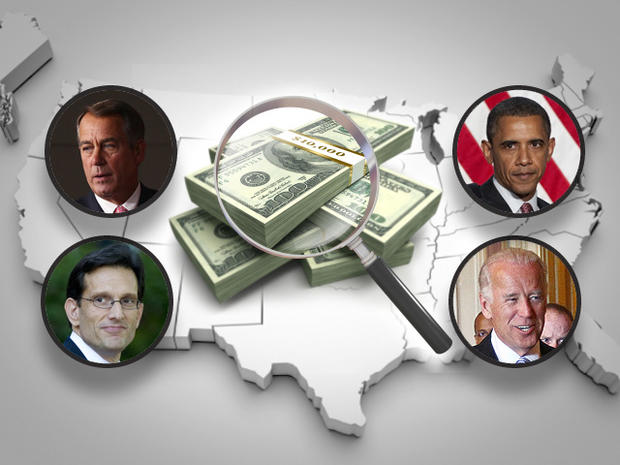The debt limit fight: A primer
The battle over a deal to raise the debt ceiling has not been easy to follow: It centers on an unfamiliar concept, the parameters seem to change nearly every day, and both sides are feverishly spinning the closed-door negotiations to make the other look as unreasonable as possible.
So we thought it was a good time to step back and explain exactly what is at stake, where both sides are coming from and where the debate will go from here. Check it out below.
What's the debt limit, anyway?: The idea that there is a legal limit on how much money the government can borrow may seem strange: After all, there is no limit on how much debt you can put on your credit card, so long as you can get someone to loan you the cash. And no other advanced economy has such an arbitrary limit, which White House economic adviser Austan Goolsbee has called a "weird construct."
Here's why it exists: Until 1917, Congress had to pass a new law every time the government wanted to borrow money. But with America needing to finance its involvement in World War I, lawmakers passed a law to give the Treasury Department leeway to borrow on its own - so long as it didn't exceed a certain amount. That's the debt limit, or debt ceiling - the amount that Treasury can borrow without going back to Congress for permission. Since America has made a habit of spending more money than it takes in, that limit has continually needed to be raised.
The debt limit has been raised ten times in the past decade - it's now roughly $14.3 trillion - but it's never an easy vote for members of Congress, who don't want to be seen as pushing the nation further into the red. (President Obama himself opposed raising the debt ceiling back in 2006, when he was a senator.) Some argue that the law itself is a "pointless, dangerous historical relic" that should be eliminated - but a vote to abolish the debt limit is even more politically toxic than a vote simply to increase it.
Why is the battle being fought now? Because Republicans won the House of Representatives in January thanks in large part to their promises of fiscal discipline. The Tea Partiers who have (sometimes grudgingly) aligned with the GOP are demanding the nation rein in its spending - and are vowing to punish Republicans who vote in favor of an increase in the debt without major concessions.
That meant what has in past years been a relatively routine - if painful - vote was suddenly elevated to a major fight in Washington. Thanks to some creative accounting by the Treasury Department, the deadline for a debt limit increase has been pushed back to August 2. After that date, the administration says, the United States will not be able to meet its obligations if Congress does not act.
What happens if no deal is reached? Nothing short of economic catastrophe, according to the administration and most economists. Though it's impossible to say exactly how a breach of the debt ceiling - something that has never occurred - will play out, lack of action could mean the U.S. dollar loses its "dominant role in the international financial system," as Treasury Secretary Timothy Geithner has put it, as the failure of the nation to meet its obligations prompts the world's creditors to seek alternatives to U.S. debt.
If the U.S. defaults to its creditors it could create worldwide economic chaos as U.S. Treasuries - long considered the safest bet there is, and thus held by governments worldwide - suddenly become less attractive. Some in Congress say the nation could potentially avoid default by prioritizing payments to creditors like China once it can no longer borrow money. But that would mean some extremely painful choices, such as suspending pay for military personnel, cutting off Social Security checks and/or many other seemingly unthinkable options. Not only is that politically untenable, the administration and many economist consider it default by another name.
Christine Lagarde, the head of the International Monetary Fund, said that a lack of action will mean "interest hikes, stock markets taking a huge hit and real nasty consequences" for America and the rest of the world.
What does each party want?: Republicans are seeking major spending cuts in exchange for their vote. Republicans are using the issue as leverage to get a broader agreement on reducing the deficit. The party shrugged off Obama administration calls for a "clean" vote to raise the debt ceiling, saying they will only vote to increase the debt limit if Democrats agree to spending cuts larger than the amount of the increase.
Democrats have agreed to work toward a deal to find trillions of dollars in deficit reduction - but they say that deal must include revenue increases, not just spending cuts. Republicans say tax hikes are simply not an option, and both sides have dug in their heels.
Complicating the negotiations is the fact that the framework for such a deal has to be in place within a couple weeks, administration officials say. Otherwise, they say, there won't be time to get it through a reluctant Congress and signed into law. On top of that, interest rates for both the public and the government could rise even before Aug. 2 if the major credit ratings agencies decide to downgrade the coveted top rating of the United States on the fear that a deal is not going to happen in time.
"The risk we face starts to happen in July. But then on August 2nd, we're left running on fumes. We have no capacity to borrow. I have to write $80 million checks a month to Americans, including 55 million Americans who depend on their Social Security check," Geithner said on CBS' "Face the Nation" on Sunday.
How messy are the politics involved?: About as messy as they could be. House Speaker John Boehner has shown a willingness during closed-door negotiations to consider closing some tax loopholes that would increase money coming into government coffers, but many in his Republican caucus - particularly the Tea Party-backed freshmen and his deputy, House Majority Leader Eric Cantor - have bucked his apparent willingness to compromise. Some House Republicans simply don't believe the administration's dire warnings about what happens if they don't act; others say they are willing to risk the repercussions if it means getting serious about deficit and debt reduction.
The picture isn't much better on the Democratic side, where liberals are angry with the president's suggestion that cuts to entitlement programs like Medicare, Medicaid and Social Security might be on the table as part of a grand compromise. Medicare, in particular, is seen as a winning issue for Democrats in the 2012 elections, thanks to Republicans' decision to back Rep. Paul Ryan's Medicare-cutting budget plan. Democratic lawmakers do not want to cede their advantage on the issue back to the GOP, and in doing so take away one of their most potent issues as they try to retake the House. Many Democrats are also unwilling to vote for a bill that includes cuts to programs for the middle class and poor but virtually no hardship for the wealthy.
Negotiations led by Vice President Biden earlier this year sought to find about $2 trillion in spending cuts over a decade, since a $2 trillion increase in the debt limit is seen as enough to get the country through the 2012 elections. (It's not entirely clear how close they got: Democrats say negotiators fell far short of the $2 trillion goal by the time the talks fell apart, but Republicans have said they identified more than $2 trillion in cuts, more than half of them from discretionary spending.) President Obama recently upped the ante by calling for a larger, $4 trillion deal, on the theory that since the vote is going to be a difficult one no matter what, lawmakers may as well seek the biggest possible deal.
Over the weekend, Republicans effectively walked away from negotiations over the larger deal, saying Democrats' insistence on raising revenues and unwillingness to make serious cuts to entitlements has made it impossible to reach the $4 trillion goal. Democrats countered that Republicans' unwillingness to give an inch on revenues is the real problem, and said that the GOP, unlike the Democrats, has stubbornly refused to compromise. The president is continuing to push for the larger deal, but no one is quite sure how it might be reached.
Where do things go from here? Leaders from both parties say they want to avoid a breach of the debt limit, and President Obama says negotiators will meet daily in an effort to get a deal done. The solution may lie in semantics: Lawmakers could agree to close some tax loopholes as part of a deal, perhaps in conjunction with a reduction in some tax rates, which each side can cast in the best possible light. (For Republicans, such a move could be couched as a simplification of the tax code that doesn't amount to a tax increase; for Democrats, it can be cast as the revenue increases they demanded in exchange for cuts to programs they support.)
To understand the nature of the discussions, consider the conversation surrounding the potential inclusion of a fix for the alternative minimum tax. The AMT was designed to make sure high-earners with significant deductions pay at least some taxes, but because it was never indexed for inflation, Congress has to pass an expensive yearly "patch" that exempts middle-class taxpayers. With a little creativity, Boehner could conceivably cast a long-needed permanent fix to the AMT as a tax cut, one that offsets the revenue increases that come from closing tax loopholes as part of a deal. He'd just have to ignore the critics who say the "tax cut" is little more than creative accounting.
Could President Obama find a way around Congress? There have been suggestions - including from Geithner - that if Congress fails to act President Obama could simply ignore the debt limit, since it's unconstitutional.
The argument centers on the 14th Amendment, which says in part, "The validity of the public debt of the United States, authorized by law...shall not be questioned." The passage has led to a debate over whether Mr. Obama has the legal authority to simply instruct Treasury to issue more debt despite the will of Congress - which the Constitution also mandates effectively holds the U.S. purse strings.
Mr. Obama has dodged questions on the issue, saying, "I don't think we should even get to the constitutional issue." The administration has signaled it is unlikely to assert its 14th Amendment right to act unilaterally, though such a move would not be unthinkable in the absence of a deal.

